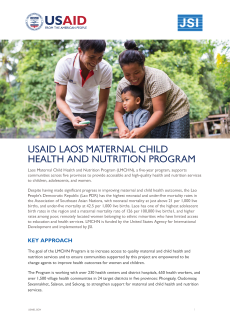Laos Maternal Child Health and Nutrition Program (LMCHN), a five-year program, supports communities across five provinces to provide accessible and high-quality health and nutrition services to children, adolescents, and women.
Despite having made significant progress in improving maternal and child health outcomes, the Lao People’s Democratic Republic (Lao PDR) has the highest neonatal and under-five mortality rates in the Association of Southeast Asian Nations, with neonatal mortality at just above 21 per 1,000 live births, and under-five mortality at 42.5 per 1,000 live births. Laos has one of the highest adolescent birth rates in the region and a maternal mortality rate of 126 per 100,000 live births1, and higher rates among poor, remotely located women belonging to ethnic minorities who have limited access to education and health services. LMCHN is funded by the United States Agency for International Development and implemented by JSI.
KEY APPROACH
The goal of the LMCHN Program is to increase access to quality maternal and child health and nutrition services and to ensure communities supported by this project are empowered to be change agents to improve health outcomes for women and children.
The Program is working with over 230 health centers and district hospitals, 650 health workers, and over 1,500 village health communities in 24 target districts in five provinces: Phongsaly, Oudomxay, Savannakhet, Salavan, and Sekong, to strengthen support for maternal and child health and nutrition services.
ANTICIPATED OUTCOMES
To achieve its vision, the Program is aligned with the Lao PDR’s Sam Sang Directive, which delegates increasing responsibility to local administrations. In support of the Ministry of Health’s Reproductive, Maternal, Newborn, and Child Health Strategy and Action Plan (2016–2025), the Program will strengthen capacity of national, provincial, and district health partners and engage communities to work with the health system to achieve better health outcomes by:
- Increasing access to, and use of, MCHN services.
- Improving the quality of MCHN services.
- Strengthening health system capacity at all levels.
- Promoting the adoption of optimal MCHN behaviors by families
and communities.
FURTHERING AN UNDERSTANDING OF MNCH BEHAVIORS IN SUPPORTED SETTINGS
The Program includes a research, monitoring and evaluation component, which will include conducting studies to both guide the direction of the LMCHN Program and further understanding of health behavior needs in related contexts. The Program conducted a baseline assessment, which included a knowledge, attitudes, and behaviors household survey and a series of focus group discussions related to maternal, child, and adolescent health. A similar endline assessment will measure changes in key outcomes. The LMCHN Program is implementing a gender equality and social inclusion analysis, and a baseline health facility assessment is planned, in addition to other analyses to better measure the experience of care in communities.


